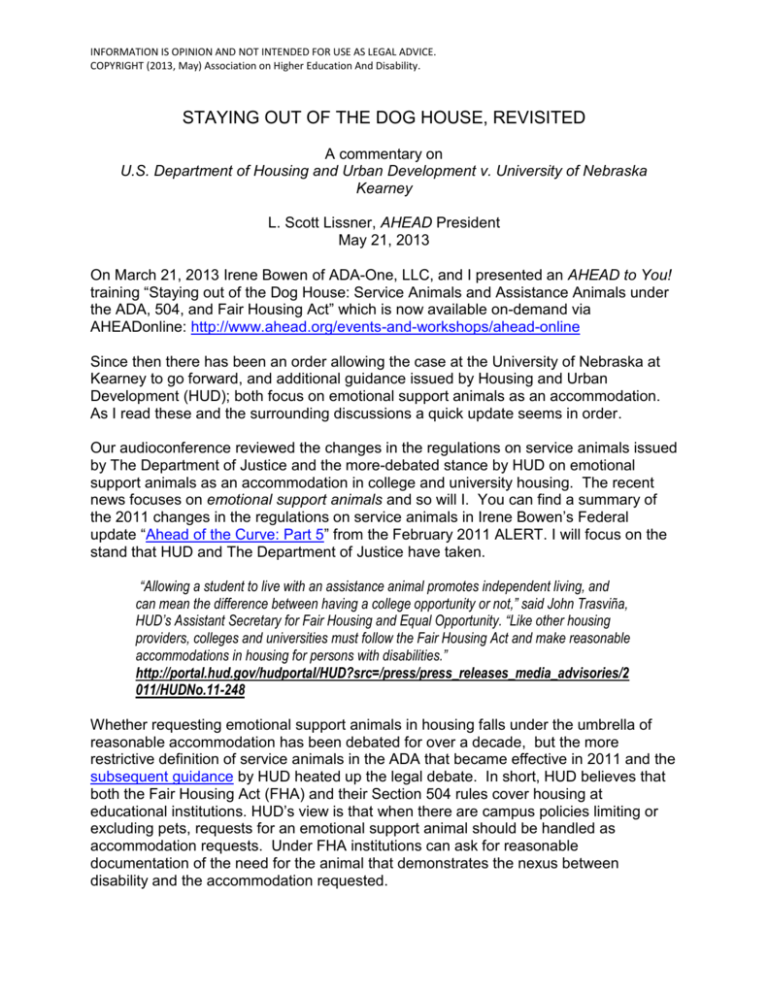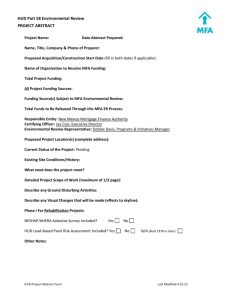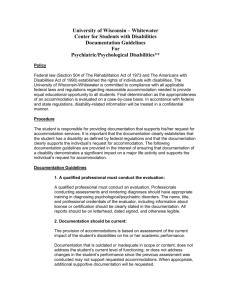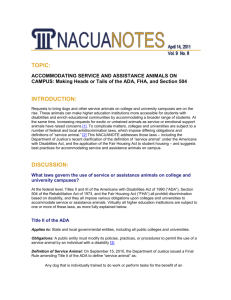Guidance on Service Animals from President Scott Lissner
advertisement

INFORMATION IS OPINION AND NOT INTENDED FOR USE AS LEGAL ADVICE. COPYRIGHT (2013, May) Association on Higher Education And Disability. STAYING OUT OF THE DOG HOUSE, REVISITED A commentary on U.S. Department of Housing and Urban Development v. University of Nebraska Kearney L. Scott Lissner, AHEAD President May 21, 2013 On March 21, 2013 Irene Bowen of ADA-One, LLC, and I presented an AHEAD to You! training “Staying out of the Dog House: Service Animals and Assistance Animals under the ADA, 504, and Fair Housing Act” which is now available on-demand via AHEADonline: http://www.ahead.org/events-and-workshops/ahead-online Since then there has been an order allowing the case at the University of Nebraska at Kearney to go forward, and additional guidance issued by Housing and Urban Development (HUD); both focus on emotional support animals as an accommodation. As I read these and the surrounding discussions a quick update seems in order. Our audioconference reviewed the changes in the regulations on service animals issued by The Department of Justice and the more-debated stance by HUD on emotional support animals as an accommodation in college and university housing. The recent news focuses on emotional support animals and so will I. You can find a summary of the 2011 changes in the regulations on service animals in Irene Bowen’s Federal update “Ahead of the Curve: Part 5” from the February 2011 ALERT. I will focus on the stand that HUD and The Department of Justice have taken. “Allowing a student to live with an assistance animal promotes independent living, and can mean the difference between having a college opportunity or not,” said John Trasviña, HUD’s Assistant Secretary for Fair Housing and Equal Opportunity. “Like other housing providers, colleges and universities must follow the Fair Housing Act and make reasonable accommodations in housing for persons with disabilities.” http://portal.hud.gov/hudportal/HUD?src=/press/press_releases_media_advisories/2 011/HUDNo.11-248 Whether requesting emotional support animals in housing falls under the umbrella of reasonable accommodation has been debated for over a decade, but the more restrictive definition of service animals in the ADA that became effective in 2011 and the subsequent guidance by HUD heated up the legal debate. In short, HUD believes that both the Fair Housing Act (FHA) and their Section 504 rules cover housing at educational institutions. HUD’s view is that when there are campus policies limiting or excluding pets, requests for an emotional support animal should be handled as accommodation requests. Under FHA institutions can ask for reasonable documentation of the need for the animal that demonstrates the nexus between disability and the accommodation requested. INFORMATION IS OPINION AND NOT INTENDED FOR USE AS LEGAL ADVICE. COPYRIGHT (2013, May) Association on Higher Education And Disability. Does the animal significantly reduce the impact of a disability thus allowing the individual to benefit from the academic residential program? The question is currently being played out in the United States v. University of Nebraska at Kearney. The University of Nebraska at Kearney has a “no pets” policy with an exception for fish and service animals. HUD charges that a student provided the University with adequate information from her medical provider establishing disability and describing her need for a therapy animal (a four-pound miniature pinscher) to help her manage symptoms of depression and anxiety so she could benefit from university housing. The University sought additional information (including treatment information, her prescribed medications, and a clinical summary of her limitations) that the student and HUD believed were intrusive and unnecessary to evaluate the student’s accommodation request. The University denied the request on the basis that the FHA does not apply to university-owned housing. As a result of the denial, the student had to move out of University housing and withdrew from the University. While getting a lot of attention, be advised that this is a District Court case; its value as precedent is limited but it is being watched and will likely inform best practice. Potentially this case will establish: Whether the Fair Housing Act and/or HUD’s Section 504 rules cover housing at educational institutions; If so What inquiries can be made to determine if such a request is supported by the student’s condition. It is less likely, but the decision may also address: What types of animals can be considered as reasonable accommodations under Section 504 and the Fair Housing Act; and What elements might support undue administrative burden in regards to such requests. On April 19, 2013 District Court Judge John M. Gerrard issued a ruling that the university housing in question is a “dwelling” under the FHA and that the trial may proceed to the substantive issues. Primary questions in the case are whether the request for an emotional support animal was reasonable, and were the inquiries by the University overly broad and intrusive? It is possible that the University will appeal this decision and that the Circuit Court would reverse it. The strongest argument that the University’s motion proffered was that the primary purpose of residence halls is to advance student’s education not provide a residence, thus making it an “educational program” not a “dwelling.” Given that students live on campus for more of the year than their family home, it seems hard to argue that providing a residence is not one, if not the primary, purpose of a INFORMATION IS OPINION AND NOT INTENDED FOR USE AS LEGAL ADVICE. COPYRIGHT (2013, May) Association on Higher Education And Disability. residence hall. The ADA recognizes that overlapping jurisdictions exist and defers to laws and regulations requiring a greater level of access. “The Department recognizes, however, that there are situations . . . particularly in the context of residential settings and employment, where there may be compelling reasons to permit the use of animals whose presence provides emotional support to a person with a disability. Accordingly, other federal agency regulations governing those situations may appropriately provide for increased access for animals other than service animals.” (73 Fed. Reg. 34516) My guess is that the ruling will stand. As part of Fair Housing Month and on the heels of the ruling discussed above, HUD issued new guidance Service Animals and Assistance Animals for People with Disabilities in Housing and HUD-Funded Programs The notice explains that the new definition of service animal under the ADA Titles II and III, does not limit the obligation of housing providers to make reasonable accommodations for assistance animals, including emotional support animals, under the FHA or Section 504. It goes on to explain that in situations where the ADA and the FHA and Section 504 apply simultaneously (e.g., a public housing agency, sales or leasing offices, or housing associated with a university or other place of education), housing providers must meet their obligations under both the reasonable accommodation standard of the FHA/Section 504 and the service animal provisions of the ADA. HUD advises that in cases where all three statutes apply, the housing provider should apply the ADA service animal test first because they may only ask whether the animal is a service animal that is required because of a disability, and if so, what work or tasks the animal has been trained to perform. If the animal qualifies as a service animal it must be permitted to accompany the individual with a disability to all areas of the facility where persons are normally allowed to go. If the animal does not meet the definition of service animal then the housing provider must engage in a reasonable accommodation analysis. “The Fair Housing Act requires housing providers to give reasonable accommodations for people with disabilities so that all have equal housing opportunities. The Fair Housing Act also ensures that when people seek an accommodation, they are not required to disclose medical information that is overly intrusive and invasive in order to receive an accommodation,” said Thomas E. Perez, Assistant Attorney General for the Civil Rights Division. “The Justice Department will continue its vigorous enforcement of fair housing laws that protect the rights of people with psychological or emotional disabilities so that they will have full opportunity to find housing as the law requires.” http://www.justice.gov/opa/pr/2011/November/11-crt-1532.html INFORMATION IS OPINION AND NOT INTENDED FOR USE AS LEGAL ADVICE. COPYRIGHT (2013, May) Association on Higher Education And Disability. RESOURCES Campus Review and Policies: • Make sure they reflect the new ADA regulations. • Consider how your reasonable accommodation policies might be adapted for housing facilities and determine what stance your institution will take based on its overall mission and philosophy, approach to access and diversity, and risk tolerance. Policies and Training: • Designate a “go-to” person or team. • Identify expectations of front line staff and when to refer to the person or team (published policy versus internal procedures) No documentation, identification or license required. The two allowable questions, “Is that a service animal for a disability?” and, if not obvious, “What service does it perform?” • Provide for faculty and staff training, including ongoing training for new hires. • Dogs only but a wide range of disabilities. Work or task examples; Exceptions for miniature horses; Considerations in student employment, internships, health care facilities, etc.; Policy on emotional support animals in residence halls. • Control and care by handler and animal conduct • Allow handler even if animal is excluded • Locations of rest areas and relief (toileting) expectations • No documentation required for the service animal itself • Examples of situations to address: • “Control” issues (anchored to the code of conduct) • Others’ disabilities: phobias, allergies – not reason to exclude, but something to be aware of, and strategize as needed • Who on campus makes decision to exclude animal if warranted Miniature Horses: Determine policy in advance, with assessment factors. • Type, size, weight (whether facility can accommodate). • Handler’s control. • Whether housebroken. • Legitimate safety requirements of specific facility. HUD’s Charge Against UNK: http://portal.hud.gov/hudportal/documents/huddoc?id=11071009308.pdf INFORMATION IS OPINION AND NOT INTENDED FOR USE AS LEGAL ADVICE. COPYRIGHT (2013, May) Association on Higher Education And Disability. Hamilton v. University of Nebraska, Kearney http://portal.hud.gov/hudportal/HUD?src=/press/press_releases_media_advisories/2011 /HUDNo.11-248 Complaint and request for Jury Trial http://www.justice.gov/crt/about/hce/documents/unkcomp.pdf District Court Ruling that the University Housing in Question is a “Dwelling” under the Fair Housing Act: http://www.ada.gov/kearney_order.pdf Joint Statement of the Department of Housing and Urban Development and the Department of Justice: Reasonable Accommodations Under the Fair Housing Act. http://www.hud.gov/offices/fheo/library/huddojstatement.pdf Pet Ownership for the Elderly and Persons With Disabilities; Final Rule http://www.hud.gov/offices/fheo/FINALRULE/Pet_Ownership_Final_Rule.pdf New ADA Regulations and Assistance Animals as Reasonable Accommodations under the Fair Housing Act and Section 504 of the Rehabilitation Act of 1973 http://www.nacua.org/documents/FHA_Memo_ServiceAnimals.PDF April 2013 Guidance by HUD on Service Animals and Assistance Animals for People with Disabilities in Housing and HUD-Funded Programs http://portal.hud.gov/hudportal/documents/huddoc?id=servanimals_ntcfheo2013-01.pdf









